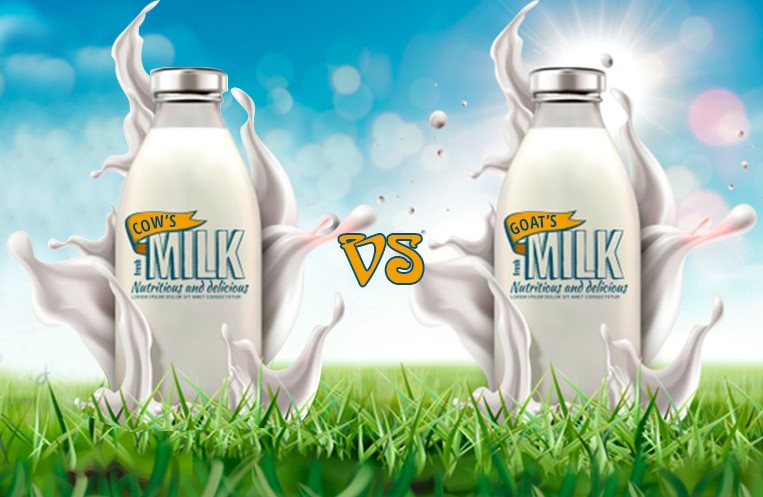When it comes to formula selection most parents might be confused about its abundance. The main task for each infant feeding is to strengthen the immune system of a baby and provide it with all the nutrients necessary for growth and development.
Even if you are familiar with the components in the content, you still can have difficulty with the base of the baby food. There are lots of discussions about which milk is better for baby formula manufacture – cow or goat.
Let’s check the difference between the formula based on cow milk and the one made on goat milk.
The Main Difference Between Cow and Goat Milk Formula

The contents of these two products are almost equal because both have proteins and fats. However, there is a difference between proteins. Cow milk contains beta-lactoglobulin, and goat milk has alpha-lactoglobulin. When the milk enters the stomach, it is curdled under the influence of gastric juice and is processed.
Goat milk has a lower percentage of curdling and as a result, it is absorbed much better that is why goat-based formula can be absorbed better for sensitive stomachs.
Regarding the fat content, they also differ, since the goat dairy product is much fatter than the cow one. The fatty acids contained in the goat dairy product saturate the intestinal cells with energy thus they are quickly restored.
Thanks to this quality, baby formula based on goat milk almost does not cause colic. Besides, the regurgitation is caused less often since the digestion process of goat formula is easier. Both types of milk contain many microelements, however, iron is better absorbed if a kid is fed with goat-milk feeding.
Some parents believe that goat formula is a good solution if a kid suffers from an allergy. In some situations, it surely helps, but this happens rarely. If a child has indigestion to cow milk protein, then the likelihood that goat-based formula won’t cause an allergy reaction is quite low.
Cow and goat milk baby food is intended for healthy kids and has no healing effect.
The Similarity Between Cow and Goat Milk Formula

The regular baby formula contains only 40-45% of natural processed milk, the rest is additives. Both cow and goat based formulas will have such components in the contents as:
- probiotics and prebiotics are added to maintain the functioning of the intestines and stabilize the microflora
- nucleotides are needed to strengthen the immune system
- for fast-growing organisms vitamins A, B, C, E are required
- potassium, iodine, folic acid, and iron are important minerals
- proteins are represented by either casein or whey
- the complex of fats is often palm oil, vegetable oil, and sometimes fish oil. Sometimes instead of palm oil, palmitic acid is included. Both goat and cow formulas have to contain omega-3 and omega-6 fatty acids
- as the main source of carbohydrates lactose or maltodextrin are usually used
The selection of goat milk formulas is not as wide as cow ones. So if you decide on goat-based feeding it could be a challenge to pick up the right one.
On organicsbestshop.com you can check the Kendamil brand which has only the best organic ingredients for proper nourishment for newborns. Kendamil is a worthy alternative to cow milk feeding because it ensures proper nutrition, development, and growth of a healthy baby.
Sometimes it is recommended to be included in the diet as a therapy for protein allergy.
Pros and Cons of Goat Milk Formula

Before switching to a goat-based diet, you should carefully study all its pros and cons. While this milk is rich in valuable fats and is considered an excellent alternative to cow and soy formulas, there are few essential vitamins and minerals in the content.
In particular, goat milk does not contain enough folate, iron, vitamin B12, and D. So it will be a good decision to supply the child’s diet with these nutrients. As goat milk has more protein than breast one, some pediatricians believe that it may harm kidney function.
Still, there are benefits of feeding babies with goat milk formula. The goat diet is more physiological for babies with sensitive digestion. So, if a child has problems with the gastrointestinal tract, then it may be more logical to use this type of feeding.
In addition, goat and human milk have the same type of secretion called apocrine. It means that cellular protective components such as nucleotides, free amino acids, and lysozymes enter the child’s organism together with formula.
Advantages and Disadvantages of Cow Milk Formula

Сow milk is used more often for formula production than goats which means such feeding has been developed and refined over the years to be more like breast milk. Furthermore, it contains more vitamin B12, selenium, and folic acid.
Some percent of newborns usually face protein intolerance. This is the big disadvantage of feeding based on cow milk. There is one of the most common allergen proteins called alpha-S1 which is distinguished by organisms as an invader causing allergy reaction.
If there is a family allergy anamnesis, then a goat formula can be a way out, however, it is not a treatment.
Is Goat Milk Formula Better?
If breastfeeding is impossible and there is an allergy to protein, frequent regurgitation, and digestive disorders, then a pediatrician may recommend goat milk formula. The digestive system of infants produces an insufficient amount of enzymes for the assimilation of certain substances.
The adapted formula on goat milk is better than on cows since it is absorbed faster by the immature organism. The amount of phosphorus is reduced, the protein is partially broken down, and micronutrients important for the development of a baby are added.
In addition, a goat-based diet is advised if a kid is low weight or if it gains weight poorly, and it is prone to frequent infections.
Which One to Select?

There could be various reasons you may decide on a specific formula, but in many cases, you have to consult with a pediatrician beforehand, because any diet changes for infants can be harmful.
No matter which milk is used as a basis for formulas, they all have to pass the strict standards to hit the market. Although there are some recommendations on how to select the formula for your little one:
- the feeding must necessarily be age correspondent
- be sure to check the ingredients(e.g. for those under six months there have to be iodine, taurine, polyunsaturated fatty acids, and nucleotides)
- check the expiration date

